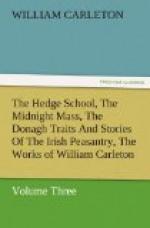“Why do I send them to Mat Meegan, is it?” he replied—“and do you think, sir,” said he, “that I’d send them to that dry-headed dunce, Mr. Frazher, with his black coat upon him, and his Caroline hat, and him wouldn’t take a glass of poteen wanst in seven years? Mat, sir, likes it, and teaches the boys ten times betther whin he’s dhrunk nor when he’s sober; and you’ll never find a good tacher, sir, but’s fond of it. As for Mat, when he’s half gone, I’d turn him agin the country for deepness in learning; for it’s then he rhymes it out of him, that it would do one good to hear him.”
“So,” said I, “you think that a love of drinking poteen is a sign of talent in a school-master?”
“Ay, or in any man else, sir,” he replied. “Look at tradesmen, and ’tis always the cleverest that you’ll find fond of the drink! If you had hard Mat and Frazher, the other evening, at it—what a hare Mat made of him! but he was just in proper tune for it, being, at the time, purty well I thank you, and did not lave him a leg to stand upon. He took him in Euclid’s Ailments and Logicals, and proved in Frazher’s teeth that the candlestick before them was the church-steeple, and Frazher himself the parson; and so sign was on it, the other couldn’t disprove it, but had to give in.”
“Mat, then,” I observed, “is the most learned man on this walk.”
“Why, thin, I doubt that same, sir,” replied he, “for all he’s so great in the books; for, you see, while they were ding dust at it, who comes in but mad Delaney, and he attacked Mat, and, in less than no time, rubbed the consate out of him, as clane as he did out of Frazher.”
“Who is Delaney?” I inquired.
“He was the makings of a priest, sir, and was in Maynooth a couple of years, but he took in the knowledge so fast, that, bedad, he got cracked wid larnin’—for a dunce you see, never cracks wid it, in regard of the thickness of the skull: no doubt but he’s too many for Mat, and can go far beyant him in the books; but then, like Mat, he’s still brightest whin he has a sup in his head.”
These are the prejudices which the Irish peasantry have long entertained concerning the character of hedge schoolmasters; but, granting them to be unfounded, as they generally are, yet it is an indisputable fact, that hedge schoolmasters were as superior in literary knowledge and acquirements to the class of men who are now engaged in the general education of the people, as they were beneath them in moral and religious character. The former part of this assertion will, I am aware, appear rather startling to many. But it is true; and one great cause why the character of Society Teachers is undervalued, in many instances, by the people, proceeds from a conviction on their parts, that they are, and must be, incapable, from the slender portion of learning they have received, of giving their children a sound and practical education.
But that we may put this subject in a clearer light, we will give a sketch of the course of instruction which was deemed necessary for a hedge schoolmaster, and let it be contrasted with that which falls to the lot of those engaged in the conducting of schools patronized by the Education Societies of the present day.




